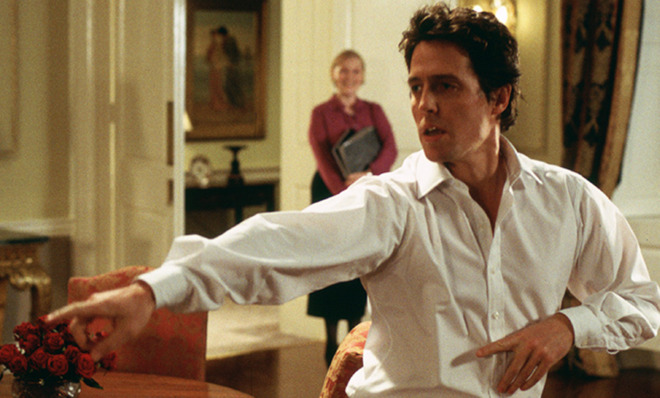How did Love Actually become so controversial? A theory
The most talked-about movie of the holiday season came out 10 years ago

A free daily email with the biggest news stories of the day – and the best features from TheWeek.com
You are now subscribed
Your newsletter sign-up was successful
If a work of art attracts the attention — and sometimes the ire — of The Atlantic, New York, Mother Jones, and ThinkProgress in a single month, it must be a pretty heavy cultural hitter. Perhaps it's the latest Banksy work, a recently discovered Salinger novella, or at the very least a new Netflix series.
But the liveliest critical debate over the past month has actually been over a rom-com — and a decade-old one at that.
For some reason, ten years after Richard Curtis' star-laden Love Actually premiered to decidedly mixed reviews, we're talking about it more than ever. Christopher Orr at The Atlantic devoted nearly 3,000 words to arguing why Love Actually is the "least romantic film of all time." With all due respect to Orr, off the top of my head, The Blair Witch Project, Fatal Attraction, and Dude, Where's My Car? are all significantly less romantic.
The Week
Escape your echo chamber. Get the facts behind the news, plus analysis from multiple perspectives.

Sign up for The Week's Free Newsletters
From our morning news briefing to a weekly Good News Newsletter, get the best of The Week delivered directly to your inbox.
From our morning news briefing to a weekly Good News Newsletter, get the best of The Week delivered directly to your inbox.
But instead of letting Orr's excessive hate lie, Ben Dreyfuss at Mother Jones dropped nearly just as many words to come to the rescue of Love Actually. And Orr's colleague Emma Green at The Atlantic successfully utilized a C.S. Lewis framework for examining the nature of love to defend the movie.
In short, a lot of smart people have spent a lot brainpower and ink over a movie in which Hugh Grant plays the prime minister of Great Britain.
I say this with wonder, even though I am as big a fan of Love Actually as they come. To paraphrase one of the best (though, in context, arguably creepiest) lines from the movie: "To me, you are perfect." I admire the film because, as Green notes, it shows that "sometimes, non-romantic relationships are more important than romantic ones, even if that fact can be frustrating and heartbreaking."
I also wholeheartedly agree with Dreyfuss that part of the joy of watching Love Actually is feeling that "yes, you are crazy, but other people are crazy, too, and you should find out if maybe they're crazy about you." And on top of all this, it has Colin Firth jumping into a lake in wet-shirted beauty. Sigh.
A free daily email with the biggest news stories of the day – and the best features from TheWeek.com
But it's still curious that the movie has garnered so much critical interest, let alone in the middle of Oscar season. I think it comes down to what the critic Eitan Kensky once said, "A generally good rom-com is treated like Citizen Kane."
Fans of romantic comedies are extra thrilled by a genuinely charming and funny film like Love Actually, which spares them from their usual task of defending the genre for allegedly being trite, sappy, and generally mediocre. This has been especially true of late, since the best rom-coms — When Harry Met Sally, Annie Hall, Four Weddings and a Funeral — are of yesteryear, while we're in an era of 27 Dresses and Failure to Launch.
In response to this outpouring of affection, people who don't enjoy Love Actually seem to get really, really mad that other people do. They can't fathom why fans feel the need to reiterate their love for it every holiday season. Thus, they critique it hard, and their critiques can become hyperbolic.
While middle- and low-brow art are completely worthy of debate, I'm not sure Love Actually itself is worth it, or at least this much of it. So much of the commentary is not about the actual movie, but a response to overheated responses on either side of the great Love Actually divide.
So perhaps everyone should take a breather. Love Actually is not a cinematic masterpiece, but it shouldn't be hated for not being one. Now, can't we all watch a little British boy chase his love through Heathrow Airport and just get along?
Emily Shire is chief researcher for The Week magazine. She has written about pop culture, religion, and women and gender issues at publications including Slate, The Forward, and Jewcy.
-
 Local elections 2026: where are they and who is expected to win?
Local elections 2026: where are they and who is expected to win?The Explainer Labour is braced for heavy losses and U-turn on postponing some council elections hasn’t helped the party’s prospects
-
 6 of the world’s most accessible destinations
6 of the world’s most accessible destinationsThe Week Recommends Experience all of Berlin, Singapore and Sydney
-
 How the FCC’s ‘equal time’ rule works
How the FCC’s ‘equal time’ rule worksIn the Spotlight The law is at the heart of the Colbert-CBS conflict